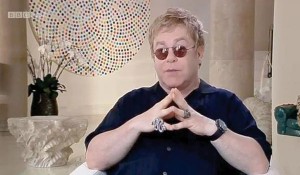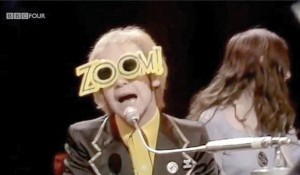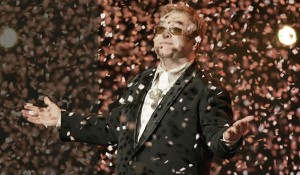Beyond the yellow brick road
Elton John’s concert on Dec. 8 at Smart Araneta Coliseum, bankrolled by the venue’s owners, is significant for the following reasons: It’s the British pop superstar’s first time to perform in Manila; he’ll be playing with two long-time members of the Elton John Band (drummer Nigel Olsson and guitarist Davey Johnstone); and at age 65, Elton as bandleader shows no signs of slowing down.
For those getting ready for his Big Dome concert, here’s something to add to the excitement. Three documentaries have been uploaded on YouTube—each one offering a glimpse of the genius behind the public persona, his struggles and triumphs, his demons and how he dealt with them.
The first one, “Two Rooms: Celebrating the Songs of Elton John & Bernie Taupin,” was originally released in 1991 simultaneously with a tribute album of the same title. The second, “Elton John: Me, Myself & I,” came out in 2007. The third, “Madman Across the Water: The Making of Elton John,” was a British Broadcasting Company production in 2010.
Highlights
Article continues after this advertisementAlthough they vary in approach, all three docus highlight the most remarkable chapters in Elton’s life and career.
Article continues after this advertisementAfter dropping out as a scholar of the Royal Academy of Music in London, he played piano at a pub near his home, until he joined his friends in a band called Bluesology.
“Rock ‘n’ roll arrived and changed my world … Jerry Lee Lewis, Little Richard, Ray Charles, Fats Domino came into play … and so, this whole new ball game,” he recalled in “Madman…”

“NOTHING’S better for you than to go out and play live, even if it’s just for 20 people because it gives you resolve, it hardens you up, makes you a better songwriter,” said Elton John in a BBC documentary. VIDEOGRAB
Answering an ad in the New Musical Express was providential. The ad, which was looking for songwriters for a record label, also caught the attention of an aspiring lyricist, Bernie Taupin. Thus was born a songwriting team that critics regarded as “the most inventive and original since Lennon and McCartney.”
That was also the time he officially changed his name from Reginald Dwight to Elton John—which combined the first names of Bluesology saxophonist Elton Dean and singer Long John Baldry.
“I adored him (Bernie). There was nothing sexual about it. He was like a brother … my first real friend,” said Elton in “Two Rooms…”
“If anything was destined, it was for him and I to be together, because I think some Higher Power said, ‘Let’s put these two together and irritate the world,” added Bernie.
The songwriting team was unique in the sense that Bernie and Elton never sat down together to write the songs.
“I love getting the lyrics from Bernie … I love creating something musical to his imagination. I’ve never gotten tired of that,” Elton pointed out. “We’ve never had an argument over a song and that’s to his credit. There must have been instances when I’ve written melodies to his songs that didn’t go. I don’t tread on his toes and he [doesn’t] tread on mine. It’s a matter of trust and love.”
Solo album
Elton’s 1969 debut solo album, “Empty Sky,” went largely unnoticed, although it contained an early version of “Skyline Pigeon.” But a self-titled follow-up release in 1970 was well-received, especially after Elton played for five nights at The Troubadour club in Los Angeles. “Nothing’s better for you than to go out and play live, even if it’s just for 20 people because it gives you resolve, it hardens you up, makes you a better songwriter,” he said in “Madman…”
In the audience on the second night of his Troubadour series was Leon Russell, whom he idolized. “He was quite a beautiful soul singer, had a huge blues awareness,” said Leon. “I thought my career was over … he was a lot more active … a lot more showmanship.”
A single from the “Elton John” album, “Your Song,” made it to the Top 10 of the US and UK charts.
“‘Your Song’ was such a sweet song … expressing love with the inarticulateness of young people,” said LA Times music critic Robert Hillburn.
“It was written out of pure innocence … I was 17 years old, never been kissed,” Bernie revealed.
But Elton’s gigs at The Troubadour was also a sneak preview of his live-wire stage act: “I always say I was a bit like the Jimi Hendrix of the piano because … I had freedom … I could fly on air and do handstands on it.”
In the same year, three months after “Elton John” was released, the critically acclaimed concept album “Tumbleweed Connection” came out, followed by 1971’s “Madman Across the Water.” But it was 1972’s “Honky Chateau” that heralded the arrival of a pop star.
First big single
“‘Rocket Man’ was the first big single,” said Elton. “I mean, a pop single … because apart from that I had ‘Your Song’ … And ‘Levon’ and ‘Tiny Dancer’ weren’t big hits at all. So … that changed everything.”

AT AGE 65, British pop superstar Elton John shows no sign of slowing down, with a hectic touring schedule. He will play for the first time in Manila on Dec. 8; at left, the flamboyant performer in 1972 wearing one of his trademark eccentric glasses.ap
In one of the docus, Russ Regan—record label boss who promoted Elton’s first US shows—said: “He became very flamboyant. All of a sudden he became this wild, crazy character … That’s what took him to the superstar (level).”
Terry O’Neill, photographer: “I thought he jumped out of his skin and became a giant show biz character … larger than life. Some of the clothes he wore were unbelievably funny.”
In a span of five years (1970-’75) Elton released an astonishing eight albums, including the hit song “Goodbye Yellow Brick Road.”
“I look back on it now … I think it’s a lot of young adrenaline, and you only have that for a certain part of your career,” said Elton in an interview at the time.
His work in the ’80s was not as remarkable as his peak years in the ’70s. Elton said: “I took a lot of coke and I still worked … I wasn’t on drugs all the time, but there are certainly records that I made when I was on drugs … You can’t think straight when you’re doing that amount of drugs. When I became an addict and alcoholic … I went to rehab.”
He bounced back in the ’90s by writing songs for the animated film “The Lion King.” Later on, he also wrote tunes for theater musicals, until he hooked up again with Leon Russell for the 2010 album, “The Union.”
Elton said: “To go forward in my career as a recording artist, I’ve got to go back … revisit what I did. That’s where my heart was… in the soulful, joyful, country, gospel, funky rock ‘n’ roll, the element of the South. That’s my true spirit.”
